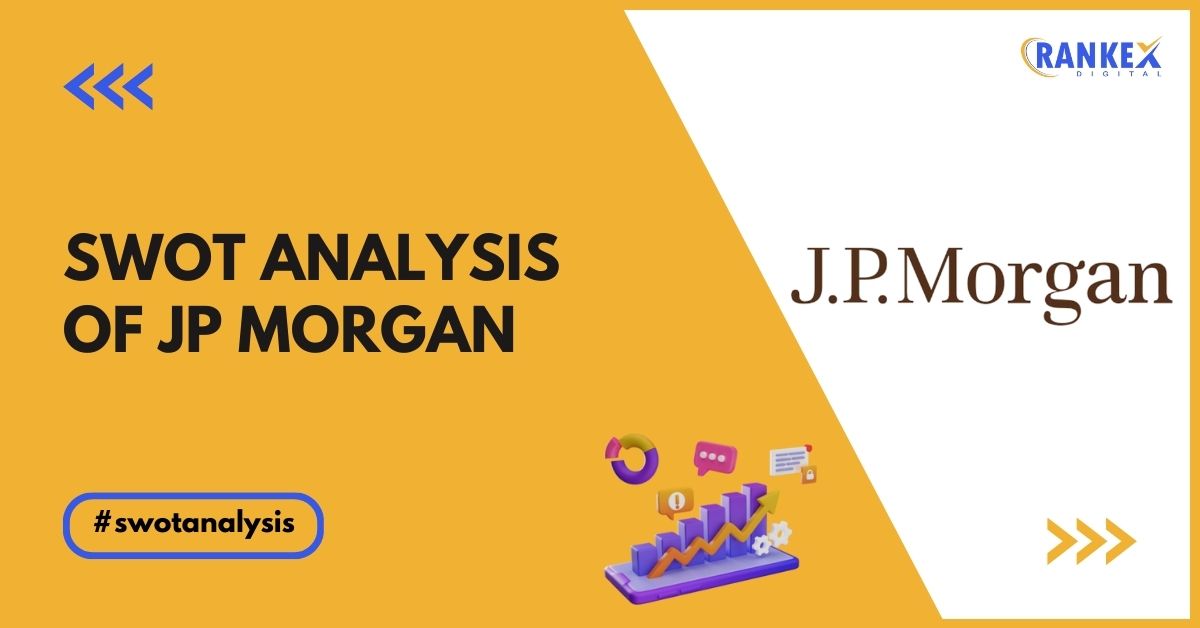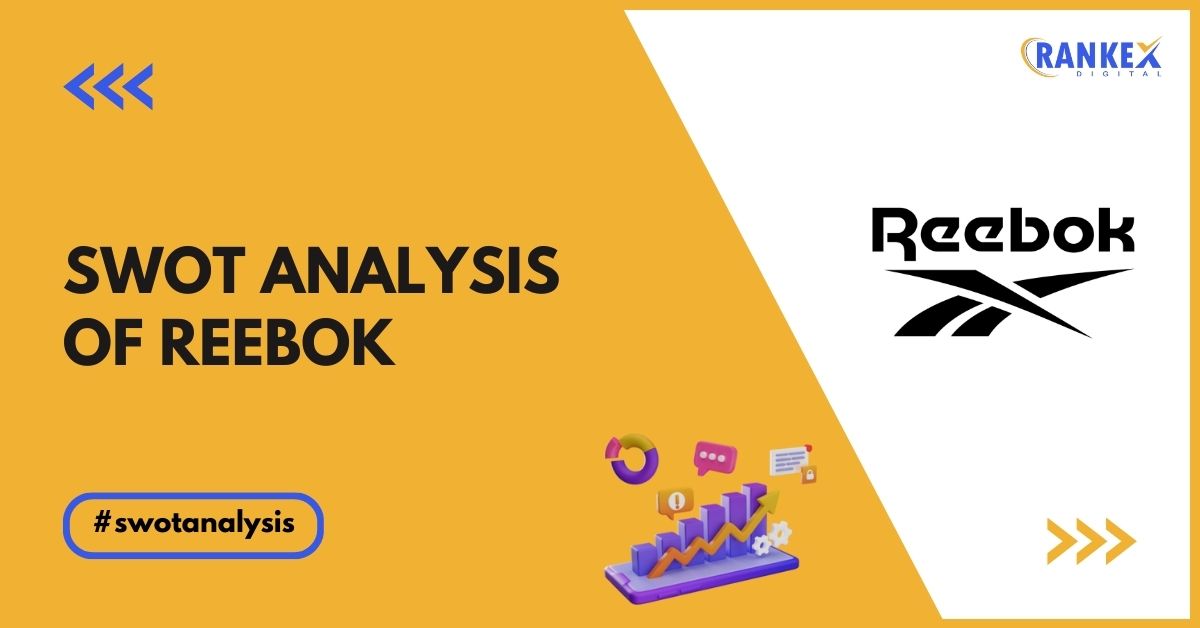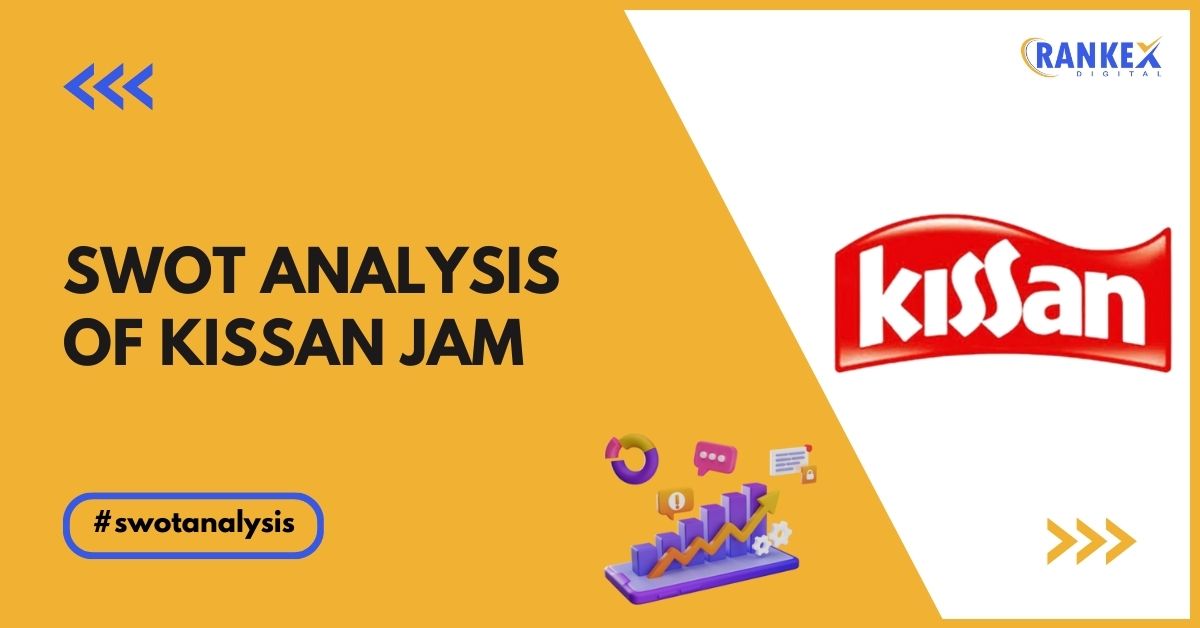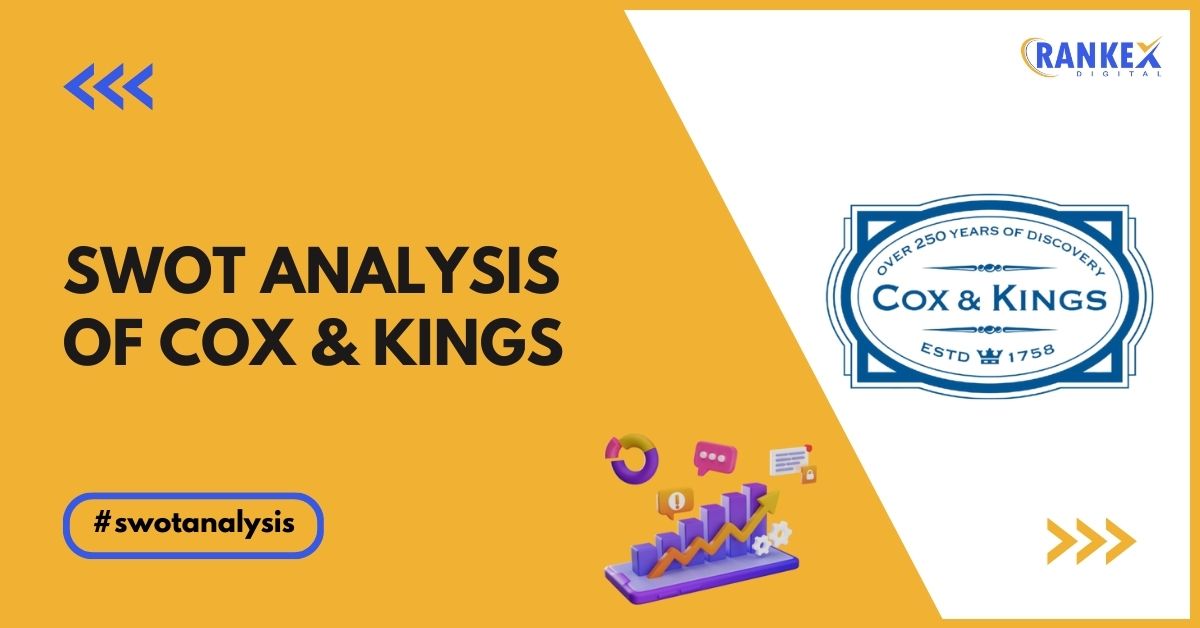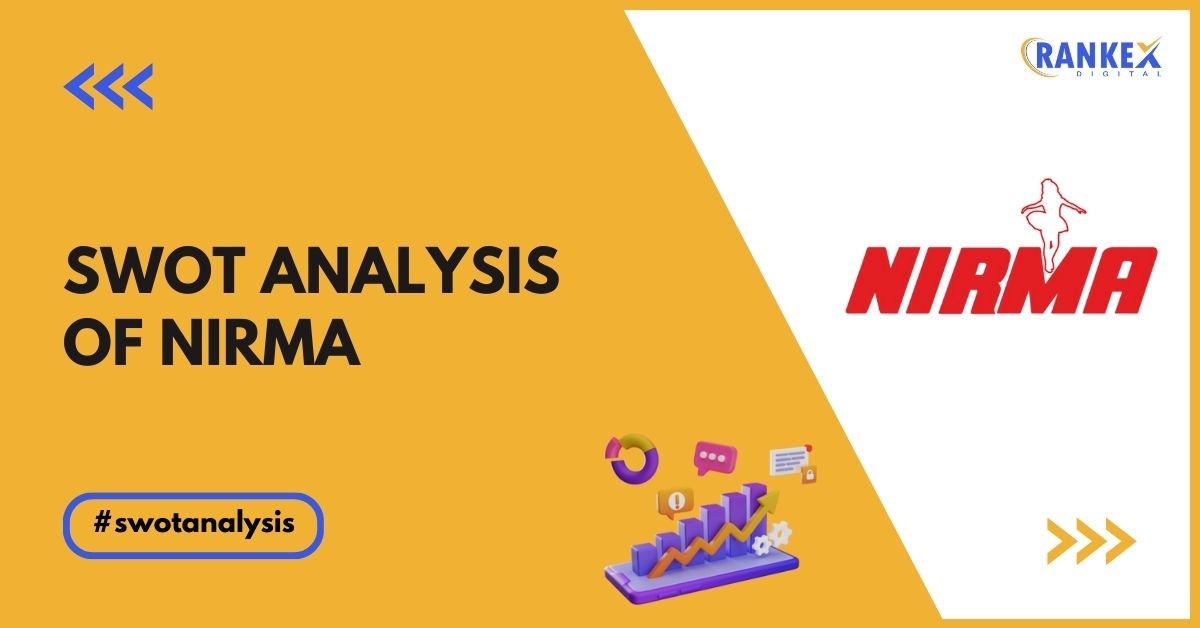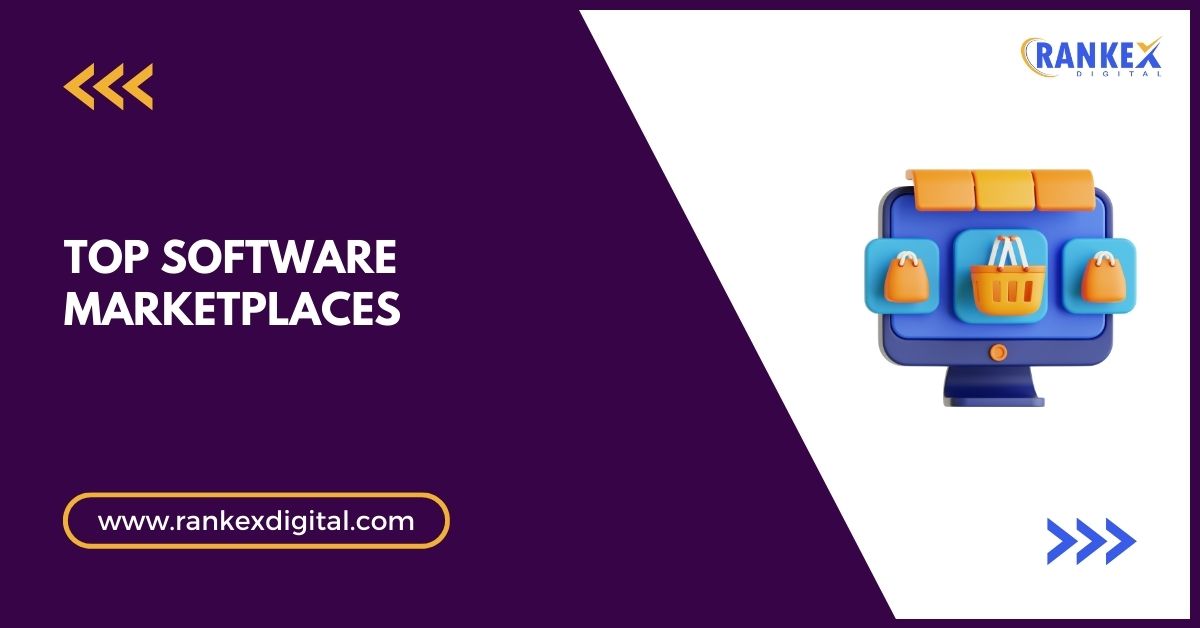JP Morgan Chase & Co., one of the largest and most prominent financial institutions in the world, is renowned for its banking services, asset management, and investment banking expertise. With a legacy of over 200 years, it plays a crucial role in shaping global financial markets and influencing economic policies worldwide.
In this blog, we will conduct a SWOT analysis of JP Morgan to understand its strengths, weaknesses, opportunities, and threats, providing insights into how this financial giant navigates the highly competitive banking landscape.
In this blog
Overview of JP Morgan
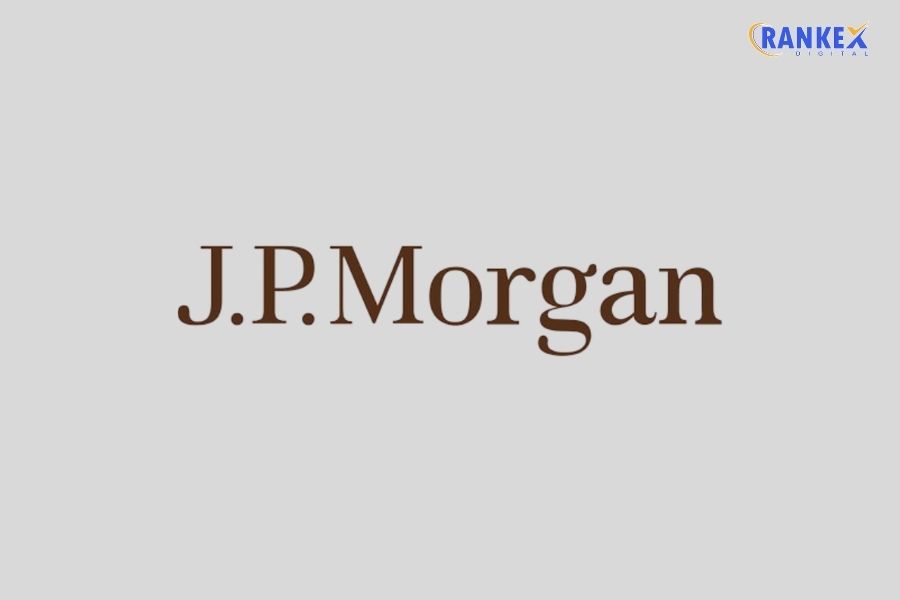
Founded in 1799, JP Morgan Chase & Co. is headquartered in New York City and operates in over 60 countries. The company offers services ranging from consumer banking and corporate banking to wealth management and investment banking.
It serves millions of customers, including individuals, businesses, and governments, and is recognized for its expertise in financial markets and economic advisory.
Quick Stats About JP Morgan
| Attribute | Details |
|---|---|
| Founder | John Pierpont Morgan |
| Year Founded | 1799 |
| Headquarters | New York City, USA |
| Employees | 250,000+ |
| CEO | Jamie Dimon |
| Revenue (2023) | $141.5 Billion |
| Net Income (2023) | $45 Billion |
SWOT Analysis of JP Morgan
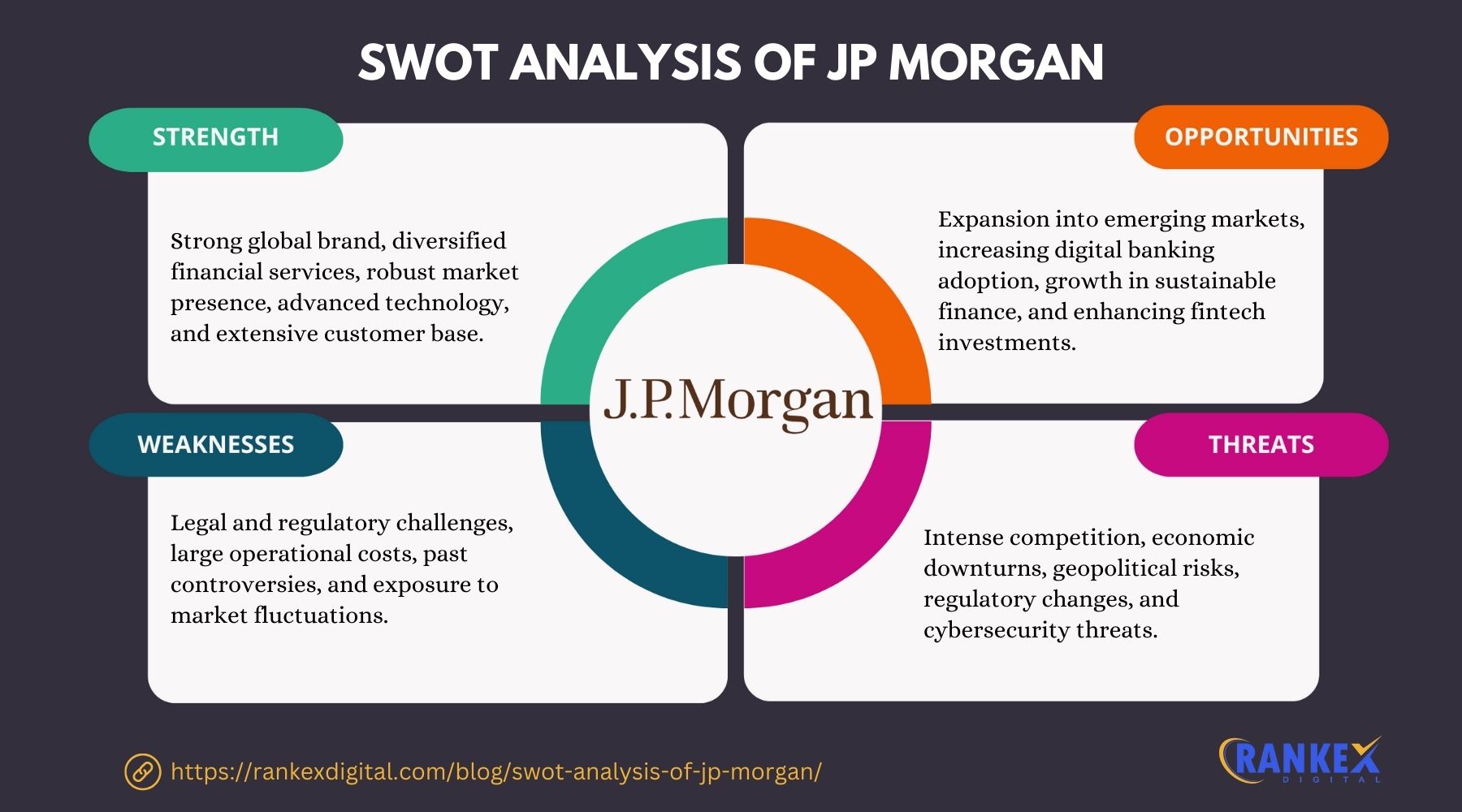
Strengths of JP Morgan
Global Presence and Market Leadership
JP Morgan is one of the largest and most influential financial institutions worldwide, boasting a dominant presence in key financial markets across North America, Europe, and Asia. Its extensive network and robust operations in investment banking, asset management, retail banking, and private equity make it a leader in the financial industry. The bank’s global footprint allows it to offer a diverse range of services, meet client needs across borders, and capture a substantial market share. JP Morgan’s leadership in both established and emerging markets positions it as a go-to financial institution for businesses and individuals seeking comprehensive, top-tier services.
Strong Brand Reputation
With over two centuries of experience, JP Morgan has built a brand that is synonymous with financial expertise, stability, and trust. As one of the most recognized names in banking, the company’s reputation for innovation and reliability has made it a preferred choice for corporations, governments, and high-net-worth individuals. Its longstanding history, combined with its consistent performance and customer-centric approach, has helped establish JP Morgan as a beacon of trust in the global financial sector. This strong brand identity helps the bank attract and retain clients, even during periods of market uncertainty.
Diverse Product Portfolio
JP Morgan offers an extensive and diverse range of financial products and services, ensuring it can meet the needs of various customer segments. The bank’s offerings include investment banking services like mergers and acquisitions (M&A), debt and equity underwriting, and trading, as well as comprehensive retail banking services such as loans, mortgages, and credit cards. Additionally, its asset management division provides clients with investment solutions across asset classes, while its private equity and wealth management services cater to high-net-worth individuals. This diversified portfolio enables JP Morgan to capture multiple revenue streams and provide a one-stop shop for clients’ financial needs.
Technological Advancements
JP Morgan has embraced technological innovation, leveraging cutting-edge technologies to enhance its financial services. The bank has integrated artificial intelligence (AI) and machine learning into various areas, including trading algorithms, risk management, and fraud detection, allowing it to improve operational efficiency and deliver more accurate insights to clients. Additionally, JP Morgan has been at the forefront of digital banking, offering advanced mobile and online banking platforms that provide seamless, secure, and convenient services to customers. By investing in emerging technologies and fintech, the bank continues to adapt to the rapidly changing financial landscape and solidify its competitive edge.
Strong Financial Performance
JP Morgan has consistently demonstrated robust financial performance, reporting high-profit margins and impressive earnings year after year. The bank’s strong balance sheet, fueled by solid asset management, investment banking revenues, and a diversified client base, allows it to weather economic downturns with resilience. Its ability to generate significant returns, coupled with its prudent risk management strategies, ensures that JP Morgan remains well-capitalized to continue expanding globally and maintaining its leadership position in the financial services industry.
Weaknesses of JP Morgan
Regulatory Scrutiny and Legal Issues
As a major financial institution, JP Morgan is subject to extensive regulatory oversight, particularly in areas such as anti-money laundering (AML), consumer protection, and financial reporting. Over the years, the bank has faced legal challenges, including regulatory fines and high-profile lawsuits, which have occasionally damaged its public image and reputation. Although JP Morgan works to ensure compliance, these legal hurdles are costly and can divert resources from other initiatives. Ongoing regulatory scrutiny also means that the bank must continually adapt its practices to meet evolving legal requirements.
Exposure to Market Volatility
Being heavily involved in investment banking, JP Morgan is highly exposed to market fluctuations. Economic downturns, stock market crashes, and changes in interest rates can directly affect the bank’s profitability. Investment banking revenues, in particular, are vulnerable to market volatility, as demand for services like M&A advisory, trading, and underwriting may decline in times of economic uncertainty. This exposure to market risk necessitates careful management of its investment portfolio and risk mitigation strategies to reduce the impact of adverse market conditions.
High Dependence on US Market
Despite its global presence, a significant portion of JP Morgan’s revenues comes from the US market, especially in retail banking and consumer loans. As a result, any slowdown in the US economy, changes in regulatory policies, or shifts in consumer behavior could negatively impact the bank’s performance. For example, a reduction in consumer spending, higher interest rates, or regulatory changes could lead to a decline in loan growth and financial product demand, impacting overall revenue generation.
Complex Organizational Structure
With its vast range of products and services and operations in numerous regions, JP Morgan’s organizational structure can be quite complex. Managing a sprawling business across investment banking, retail banking, asset management, and private equity requires a highly coordinated effort across departments, regions, and business units. This complexity can sometimes lead to inefficiencies in decision-making, slower response times to market changes, and challenges in aligning diverse teams around a common strategy. Simplifying the organizational structure and enhancing cross-functional collaboration could help improve agility and operational efficiency.
Opportunities for JP Morgan
Expansion in Emerging Markets
JP Morgan has significant growth potential in emerging markets, particularly in regions like Asia, Africa, and Latin America. These areas are experiencing rapid economic growth, an expanding middle class, and increasing demand for banking and financial services. By focusing on these developing economies, JP Morgan can tap into new customer segments, such as small and medium-sized enterprises (SMEs) and underserved populations, who are seeking access to financial products like loans, insurance, and wealth management. Expanding in emerging markets provides the opportunity for long-term growth and diversification away from more mature markets.
Increased Demand for Wealth Management Services
As global wealth continues to grow, particularly in emerging economies, the demand for personalized wealth management and financial advisory services is on the rise. High-net-worth individuals (HNWIs) and ultra-high-net-worth individuals (UHNWIs) are increasingly seeking tailored financial solutions to manage their investments, plan for retirement, and safeguard their wealth for future generations. JP Morgan has the opportunity to strengthen its wealth management division and attract a larger share of this growing market by offering sophisticated financial planning, investment advice, and estate management services.
Sustainability and Green Finance
As climate change becomes a more pressing global issue, sustainable finance and green investments are gaining momentum. JP Morgan has the opportunity to increase its involvement in green finance by offering funding for renewable energy projects, sustainable businesses, and carbon offset initiatives. By focusing on environmentally responsible investments, the bank can align itself with global sustainability trends and tap into an increasingly popular market among investors and clients who prioritize environmental, social, and governance (ESG) factors.
Advancements in Fintech
The rise of fintech companies is transforming the financial services industry, and JP Morgan has an opportunity to strengthen its digital banking offerings through partnerships, investments, or acquisitions in the fintech space. By embracing innovative technologies such as blockchain, digital wallets, and payment solutions, JP Morgan can enhance its digital infrastructure, attract younger tech-savvy clients, and offer more convenient services. This shift will help the bank stay competitive in the evolving financial landscape and meet the increasing demand for digital financial products.
Mergers and Acquisitions
JP Morgan can drive growth through strategic mergers and acquisitions (M&A). This could involve acquiring firms in emerging markets, fintech startups, or companies that complement its existing product lines, such as asset management firms or digital banking providers. Acquiring these companies could help JP Morgan quickly expand its capabilities, gain access to new customer segments, and enhance its service offerings, strengthening its competitive position globally.
Threats to JP Morgan
Intense Competition
The financial services industry is highly competitive, with JP Morgan facing strong competition from other global financial giants like Goldman Sachs, Bank of America, Citigroup, and Wells Fargo. In addition, fintech companies and digital banks are rapidly gaining ground, offering innovative solutions that challenge traditional banking models. This increased competition, particularly in areas like digital banking, asset management, and payment systems, could erode JP Morgan’s market share and pressure margins.
Economic Downturns
Global economic instability, including recessions, inflation, and fluctuating interest rates, poses a significant threat to JP Morgan’s operations. Economic downturns can reduce demand for financial products such as loans, mortgages, and investment services. Additionally, reduced consumer and business spending can decrease the volume of transactions, while market volatility can lead to lower investment returns, affecting both JP Morgan’s revenue and profitability.
Cybersecurity Risks
As one of the largest financial institutions in the world, JP Morgan is a prime target for cyberattacks. A significant data breach or cybersecurity incident could have severe repercussions, including reputational damage, financial losses, regulatory fines, and a loss of customer trust. Ensuring the safety and security of its systems is paramount, and any failure to prevent cybercrime could undermine the bank’s credibility and lead to legal and operational consequences.
Geopolitical Uncertainty
Political instability, trade wars, and economic sanctions in key markets can disrupt JP Morgan’s global operations. Changes in international relations and regulatory environments can lead to compliance challenges and impact cross-border transactions and investments. Geopolitical risks can also create volatile market conditions, affecting the bank’s profitability and global expansion plans.
Rising Interest Rates
While higher interest rates may benefit certain aspects of JP Morgan’s operations, such as its lending business, they can also reduce the demand for loans, mortgages, and other financial products. Higher rates may lead to lower borrowing activity from both consumers and businesses, negatively impacting loan growth and the bank’s lending profitability. Additionally, rising interest rates could lead to reduced investment returns in fixed-income securities, affecting the bank’s asset management and investment operations.
Frequently Asked Questions
- What is JP Morgan known for?
JP Morgan is recognized as one of the largest and most influential financial institutions in the world. It is known for its leadership in investment banking, asset management, retail banking, and private equity services. The bank has a strong reputation for financial expertise, innovation, and global reach, providing services to individuals, corporations, and governments. - How does JP Morgan contribute to investment banking?
JP Morgan is a leader in investment banking, offering services such as mergers and acquisitions (M&A) advisory, capital raising, debt and equity underwriting, and trading. The bank is renowned for its ability to handle complex financial transactions and provide strategic advice to large corporations and governments around the globe. - What services does JP Morgan offer to individual customers?
JP Morgan provides a broad range of services to individual customers, including checking and savings accounts, credit cards, mortgages, personal loans, and wealth management services. Its consumer banking division is known for its user-friendly digital platforms, making it easy for clients to manage their finances and access financial products. - How is JP Morgan leveraging technology in finance?
JP Morgan has embraced technological advancements such as artificial intelligence (AI), machine learning, and blockchain to enhance its financial services. The bank uses AI and machine learning for tasks like trading, risk management, and fraud detection. Additionally, it offers innovative digital banking services to clients, improving convenience and security. - What is JP Morgan’s strategy for global expansion?
JP Morgan is focused on expanding its presence in emerging markets like Asia, Africa, and Latin America. As these regions experience economic growth and an expanding middle class, the bank aims to capture new opportunities by providing banking and financial services tailored to these markets. JP Morgan’s global reach allows it to diversify its revenue streams and reduce reliance on mature markets. - What is JP Morgan’s approach to sustainability and green finance?
JP Morgan is committed to promoting sustainability through green finance. The bank is involved in funding renewable energy projects and supporting businesses with sustainable practices. It also emphasizes the importance of environmental, social, and governance (ESG) factors in its investments and financial products, aligning with global trends toward sustainability. - What are the main risks that JP Morgan faces?
Some of the key risks for JP Morgan include exposure to market volatility, regulatory scrutiny, cybersecurity threats, and geopolitical uncertainty. The bank is also vulnerable to economic downturns that can impact its lending and investment activities. Additionally, competition from other major banks and fintech companies presents challenges to its market share. - How does JP Morgan manage its legal and regulatory risks?
As a major financial institution, JP Morgan is subject to extensive regulation and legal oversight across its global operations. The bank works to maintain compliance with all applicable laws and regulations, but has occasionally faced legal challenges and fines. Managing regulatory risks is a key priority for the bank, and it invests in legal resources and compliance measures to mitigate potential issues.
Conclusion
JP Morgan is a financial powerhouse with a rich history and a dominant presence in global financial markets. The bank’s strengths lie in its expansive global reach, strong brand reputation, diverse product portfolio, technological advancements, and solid financial performance. Its leadership in investment banking, wealth management, and consumer banking allows it to serve a wide range of clients, from individuals to large corporations, while maintaining stability and innovation.
However, JP Morgan does face several challenges. Regulatory scrutiny, exposure to market volatility, and dependence on the US market are ongoing risks that could affect its performance. Additionally, the bank’s complex organizational structure and legal issues require continuous management and adaptation. While the rise of fintech companies and intense competition from other financial institutions poses a threat, JP Morgan’s ability to adapt and leverage technology can help maintain its competitive edge.
The bank has substantial opportunities for growth, particularly in emerging markets and through its efforts in green finance and wealth management services. Technological advancements, including the use of AI and blockchain, also provide avenues for innovation and greater operational efficiency. As the global financial landscape continues to evolve, JP Morgan’s strong leadership, commitment to sustainability, and strategic focus on digital banking will likely enable it to navigate challenges and capitalize on new opportunities.
In conclusion, JP Morgan’s ability to combine its historical strengths with forward-thinking strategies positions it as a leading player in the financial services sector. With a diversified portfolio, technological prowess, and a focus on global expansion, the bank is well-equipped to maintain its status as a key player in the ever-changing financial landscape.

